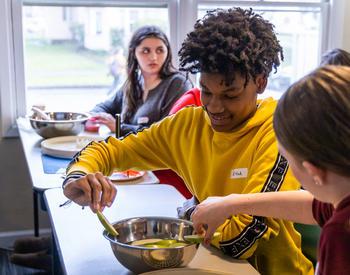For those who celebrate Easter, coloring and hiding eggs can be a fun tradition you share with your family and friends. Remember to take safety into consideration at each step along the way to keep the eggs safe to eat!
Preparing the eggs
- Wash hands before starting each step of preparing the eggs.
- Place raw eggs in a large pan. Cover eggs with cold water. Place pan on stove with a lid on it. Bring to a boil. Turn off burner and let set for 15 minutes.
- Finish cooling in cold water. When cold, refrigerate in covered container until ready to color eggs.
- Wash hands before coloring the eggs. Return eggs to refrigerator immediately after coloring.
- Do not leave cooked eggs at room temperature for more than 3 hours (cumulative).
- If eggs crack during the hiding and finding process, discard.
- Cooked eggs that have been properly handled and refrigerated can safely be used for up to one week.
DO NOT EAT eggs that have become cracked or left at temperatures above 40°F for more than 2-3 hours.
Cooking tip: If the yolks of hard cooked eggs turn greenish blue the eggs were cooked at too high of a temperature. Never boil eggs.
Dyeing eggs
Try dyeing eggs with natural dyes. Adding a little vinegar or lemon juice to the coloring liquid will speed up the dyeing process. Here are some suggestions for natural dyes:
- Pink—Pickled beet juice.
- Green—Chopped frozen spinach cooking liquid.
- Orange—Grated carrots squeezed to get out the juice, mix juice with vinegar.
- Lavender—Grape juice with vinegar.
- Red—Boiled red onions or red cabbage mixed with vinegar.
Suggestions for using cooked eggs
- Deviled eggs.
- Egg salad sandwich spread.
- Chopped eggs can be added to tossed green salads, and potato and pasta salads.
- Blend eggs with ranch dressing for a vegetable dip.
- Pickled eggs.
Check out the publication: Proper Egg Handling: From Farm or Grocery Store to Table



















